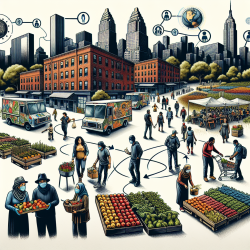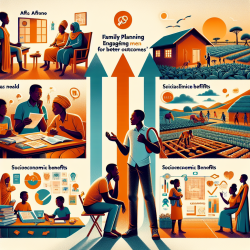Introduction
The COVID-19 pandemic has highlighted significant vulnerabilities in various systems worldwide, with food security being one of the most critical areas affected. The research article "The COVID-19 pandemic and food assistance organizations’ responses in New York’s Capital District" provides valuable insights into how food assistance organizations adapted to unprecedented challenges. This blog explores the findings and suggests how practitioners can leverage these insights to enhance their skills and improve outcomes for communities in need.
Key Findings from the Research
The study conducted in New York's Capital District reveals several innovative strategies employed by food assistance organizations during the pandemic:
- Increased Demand: There was a significant rise in the utilization of emergency food services, which remained above pre-pandemic levels even after initial spikes.
- Adaptive Strategies: Organizations quickly reorganized their operations, tapped into new volunteer sources, and collaborated with public and private entities to meet the increased demand.
- Network Strengthening: The pandemic prompted organizations to strengthen their networks, facilitating better resource allocation and service delivery.
- Innovation in Service Delivery: The shift to contactless models and the introduction of mobile food systems were key innovations that helped maintain service delivery during lockdowns.
Implications for Practitioners
Practitioners in the field of food assistance and beyond can draw several lessons from these findings:
- Embrace Flexibility: The ability to quickly adapt to changing circumstances is crucial. Practitioners should develop flexible operational strategies that can be adjusted as needed.
- Strengthen Networks: Building robust networks with other organizations and stakeholders can enhance resource sharing and collaborative problem-solving.
- Innovate Continuously: Crisis situations can be catalysts for innovation. Practitioners should encourage a culture of innovation to explore new service delivery models and improve efficiency.
- Focus on Long-term Solutions: While immediate responses are necessary, addressing the root causes of food insecurity requires a long-term, systemic approach.
Encouraging Further Research
The research underscores the importance of continuous learning and adaptation. Practitioners are encouraged to engage in further research to explore the effectiveness of different strategies and to identify best practices that can be applied in various contexts.
Conclusion
The COVID-19 pandemic has been a challenging period for food assistance organizations, but it has also been a time of significant learning and innovation. By embracing flexibility, strengthening networks, and fostering a culture of continuous innovation, practitioners can enhance their ability to respond to future crises and improve food security outcomes for vulnerable populations.
To read the original research paper, please follow this link: The COVID-19 pandemic and food assistance organizations’ responses in New York’s Capital District.










